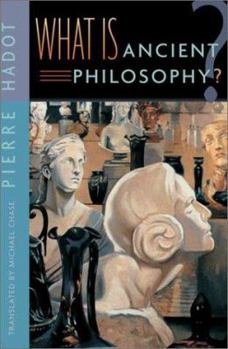What is Ancient Philosophy?
A magisterial mappa mundi of the terrain that Pierre Hadot has so productively worked for decades, this ambitious work revises our view of ancient philosophy--and in doing so, proposes that we change... This description may be from another edition of this product.
Format:Hardcover
Language:English
ISBN:0674007336
ISBN13:9780674007338
Release Date:June 2002
Publisher:Belknap Press
Length:362 Pages
Weight:1.38 lbs.
Dimensions:1.4" x 5.5" x 8.6"
Customer Reviews
5 ratings
The Practice of Philosophy
Published by Thriftbooks.com User , 18 years ago
The idea of philosophy as a lived practice, rather than an academic discipline from which one retires at the end of the work day, is articulated by Hadot through the many examples of ancient philosophy in the western tradition. The writing here is engaging enough that it doesn't matter if you don't know Epictetus from Epicurus, you will get something out of this book. That aside, even the most lofty, Greek-reading classicist should be able to find something of interest since Hadot presents his ideas (and the ancients themselves) with such life. This book is another reminder that the history of philosophy isn't just the history of ideas and disembodied arguments, it is the history of people, their situations, and their practices.
ancient philosophy on its own terms
Published by Thriftbooks.com User , 18 years ago
The crucial thing about this book is that its author, while a noted practicing Philospher himself, clearly understands, and can clearly explain, the deep divide between what passes for Philosophy today and what it once was. Ancient Philosophy was a way of looking at one's life, and a way of living one's life. But don't expect a new-agey self-help book, either! This is not a book of platitudes - it is a thoughtful and at times difficult book. The main focus of the book is on the development of Platonism and Stoicism - but Hadot takes us on a few side-roads as well. There is a great deal of attention given to later Platonism in particular. This aspect of the book is what makes it so important, in my opinion. Hadot tells the story of how the "Hellenes" circled their philosophical and spiritual wagons in the waning days of Classical Civlization - so-called Late Antiquity. But there is no sentimentality or histrionics. If you are like me then as soon as you finish this book you will get and read Aurelius' "Meditations" - and then promptly move on to reading Plato. More than anything else this book is a perfect starting point for reading Plato.
Great for philosophers and nonphilosophers alike
Published by Thriftbooks.com User , 19 years ago
Accessible to any reader interested in what philosophy was like before it was taken over by the academic professors, especially under the influence of Christianity. This book is an introduction to the problems and arguments that constitute ancient philosophy. In keeping with Socrates' dictum that the unexamined life is not worth living, Hadot shows that philosophy was not simply a process for creating theories but, more importantly, a way of life for many. Although we should be grateful to the translator for performing the tedious task; the translation is somewhat flat. However, I doubt there is a specialist in ancient philosophy who will not be enriched by reading this book and warmly recommend it to those in between.
Philosophy as a way of life
Published by Thriftbooks.com User , 20 years ago
Pierre Hadot's thesis is that the ancient Greek philosophical schools did not view philosophy merely as an abstract theoretical discipline, but as a transformative spiritual path. He also shows how this view became incorporated into Christianity and how it has definite similarities to Buddhism and Taoism. Ancient Greek philosophy has much to teach us, and Plato would have agreed with Marx that philosophy should not just interpret the world, but also change it. A fairly easy book to read, and (if you are interested in philosophy) enjoyable.
A crucial book
Published by Thriftbooks.com User , 21 years ago
Pierre Hadot's approach, which studies the ancient Greek philosophers with an emphasis on the existential choice that lies at the heart of their philosophical life, is generally well respected but also rubs a lot of people the wrong way. Some have entirely subsumed philosophy under the category of 'philosophical discourse', and thus consider the ancient notion of philosophia with skepticism; others might accuse Hadot of turning his back to modernity and its urgent interrogations, choosing instead to seek refuge in a remote past; theorists of a supposed 'crisis of values' who have apparently disqualified the ancients regarding ethics, or proponents of 'applied ethics' who have taken a similar road. What is ironic is that those who adopt a secular point of view and fear that Hadot wants to bring ancient philosophy dangerously close to a religious, monastic life, tend to use arguments very similar to those of the Christians who gradually stripped that philosophy of its ethical, spiritual roots (Hadot writes about this latter theme here). Meanwhile, one should note that Hadot's book is anything but dogmatic: the author does not posit a 'peak' of philosophy and then an unremediable decadence afterwards; he rather argues that the notion of philosophy as a way of life has in fact survived, however unevenly, throughout the history of philosophy. Thus, the object of the book is less some sort of remote past and ideas, but a very healthy and living line of thought that still feeds modern thinkers and can obviously enable us to face the problems modernity entails. This crucial book should be read by every philosopher.





